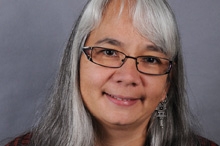Fostering Allies and Advocates through Developing Empathy
 Karen L. Suyemoto is being honored as a Champion of Change for her efforts as an AAPI Women leader.
Karen L. Suyemoto is being honored as a Champion of Change for her efforts as an AAPI Women leader.
I initially became a clinical psychologist to help heal individual pain through psychotherapy. Now I use my skills in my scholarship, teaching, and mentoring to help people tolerate and move through the pain of understanding social inequities in order to transform that pain into social justice action. As an Associate Professor of Clinical Psychology and Asian American Studies, my work focuses particularly on empowering Asian Americans and Pacific Islanders to resist oppression and on developing coalitions across privilege, not only to enlist allies in the movement for racial justice, but also to address the ways in which we may enact discrimination within our own AAPI communities.
In my teaching and my research, I aim to foster understanding that everyday moments in our lives are choices that either compound the pain of injustice or contribute to healing. This understanding is particularly important in educating human service professionals, where the positive or negative effects of such choices are magnified through their effect on service provision, teaching, modeling, and organizational policy.
In my work, I collaborate with students and professionals to dismantle the “armor of ignorance” that sustains injustice. Together, we explore and validate the pain of discrimination. Simultaneously, we engage in a painful and difficult journey of coming to know the "other," to see ourselves within them and them within us, to care for and about them, and to see and share the pain of injustice. This is a process of understanding and feeling the everyday realities of oppression and privilege, along with the practical and relational costs of these inequities.
Dismantling the armor enables the development of true empathy. Empathy is the ability to feel with another, not just for another. Empathy involves the willingness to hold another’s pain alongside one’s own. This kind of empathy forms the basis of authentic relationships and motivates the transformation of pain into action. As (then) Senator Obama said in 2006: “Empathy is a quality of character that can change the world—one that makes you understand that your obligations to others extend beyond people who look like you and act like you and live in your neighborhood…. it’s not always easy…. But I hope you don’t do what’s easy. I hope you do what’s hard.”
My scholarship and teaching encourage doing what is hard by illustrating the personal and relational benefits of choosing that path. In my experience, as you come to understand the personal responsibility inherent in your choices, you become empowered to transform pain into action that reduces the negative impact of racism and social injustice.
Everyday, I am impressed by the courage my students show in removing their armor to realize their desire to be good, just people. Continually, I am inspired by the ways that they use their learning in everyday actions that challenge oppression in their roles as human service providers, community organizers, faculty members, clinic directors, researchers, community leaders, and engaged citizens. My nomination as a White House Champion of Change is particularly meaningful to me because it was initiated by some of these courageous students and supported by so many students and colleagues. I am deeply honored and humbled by being selected. That others recognize the value in what I do makes me believe even more strongly in the ripple effect: together we can change the world.
Karen L. Suyemoto is an Associate Professor of Clinical Psychology and Asian American Studies at the University of Massachusetts, Boston.
White House Blogs
- The White House Blog
- Middle Class Task Force
- Council of Economic Advisers
- Council on Environmental Quality
- Council on Women and Girls
- Office of Intergovernmental Affairs
- Office of Management and Budget
- Office of Public Engagement
- Office of Science & Tech Policy
- Office of Urban Affairs
- Open Government
- Faith and Neighborhood Partnerships
- Social Innovation and Civic Participation
- US Trade Representative
- Office National Drug Control Policy
categories
- AIDS Policy
- Alaska
- Blueprint for an America Built to Last
- Budget
- Civil Rights
- Defense
- Disabilities
- Economy
- Education
- Energy and Environment
- Equal Pay
- Ethics
- Faith Based
- Fiscal Responsibility
- Foreign Policy
- Grab Bag
- Health Care
- Homeland Security
- Immigration
- Innovation Fellows
- Inside the White House
- Middle Class Security
- Open Government
- Poverty
- Rural
- Seniors and Social Security
- Service
- Social Innovation
- State of the Union
- Taxes
- Technology
- Urban Policy
- Veterans
- Violence Prevention
- White House Internships
- Women
- Working Families
- Additional Issues

